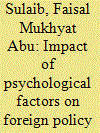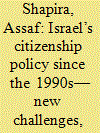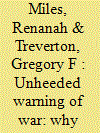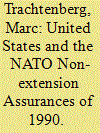| Srl | Item |
| 1 |
ID:
140089


|
|
|
| 2 |
ID:
168627


|
|
|
|
|
| Summary/Abstract |
Israel’s highly restrictive citizenship policy constitutes the clearest indicator of its dominant ethnic model of citizenship. However, this policy has faced new challenges since the early 1990s, following the mass migration of non-Jewish immigrants. This paper examines and characterizes changes in immigrants’ entitlement to Israeli citizenship since the 1990s. It indicates that while Israel’s traditional citizenship policy has not undergone any significant change, two trends are evident: a much more restrictive policy towards Arab immigrants; and a somewhat more inclusive policy concerning other immigrants. To explain how these conflicting trends have coexisted, this study identifies three major characteristics of the Israeli policy: widespread use of the ‘divide and rule’ technique; managing policy through bureaucratic decisions; and the growing assimilation of liberal and republican principles into Israel’s citizenship policy, although without undermining—on the contrary, even reinforcing—the dominant ethnic model of citizenship. These findings indicate that although the dominant ethnic citizenship model in Israel remains stable, and can successfully tackle significant obstacles, limited opportunities exist for greater inclusion of specific non-Jewish populations within the Israeli polity.
|
|
|
|
|
|
|
|
|
|
|
|
|
|
|
|
| 3 |
ID:
153073


|
|
|
|
|
| Summary/Abstract |
This article examines the lack of policy response to the 1990 U.S. National Intelligence Estimate (NIE) that predicted the collapse of Yugoslavia. Contrary to common criticisms of estimative intelligence, the NIE was accurate and unambiguous. Why was good intelligence unheeded? For some policymakers, the analysis was not closely tied to their interests and competed with other priorities for attention; for those who were substantive experts, the NIE’s grim message was hard to accept. Moreover, policymakers read intelligence reports in the context of popular concepts – a lingering Cold War lens distorted more than it clarified. Finally, while the NIE made hard-hitting judgments, it did not include any analysis of opportunities to influence the outcome. Rather than pushing an already difficult estimate to the breaking point, including opportunities would likely have increased the odds of policymakers taking action. These lessons have broader implications for analytical tradecraft and the often-challenging relationship between intelligence and policy.
|
|
|
|
|
|
|
|
|
|
|
|
|
|
|
|
| 4 |
ID:
176513


|
|
|
|
|
| Summary/Abstract |
The Russian government has claimed that the Western powers promised at the end of the Cold War not to expand NATO, but later reneged on that promise. Most former officials in the West, and many scholars as well, have denied that this was the case; but other scholars, along with a handful of former officials, believe that promises to that effect were, in fact, made in 1990. So who is right? The question still has political importance: how it is answered has bearing on how we should feel about NATO expansion and, indeed, about the United States' post–Cold War policy more generally. So it makes sense to stand back and try to see where the truth lies. An examination of the debate in light of the evidence—especially evidence that the participants themselves have presented—leads to the conclusion that the Russian allegations are by no means baseless, which affects how the U.S.-Russian relationship today is to be understood.
|
|
|
|
|
|
|
|
|
|
|
|
|
|
|
|